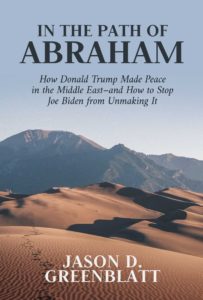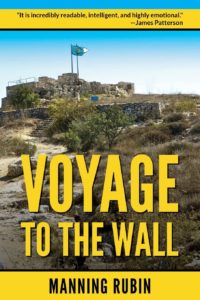Kenneth Timmerman, Jason Greenblatt, and Manning Rubin have probably never met. But they share characteristics that make them quintessential Americans. They are willing to challenge conventional wisdom – Timmerman by the American left and America’s European allies, Greenblatt by America’s Middle East “peace processing community,” and Rubin by his upbringing as a small town American Jew – and create something better. They find themselves changed by their experiences. They are willing to tackle what they perceive as their own shortcomings – again to create something better. They epitomize the ability of Americans to change, grow, and write their own narratives.
Timmerman and Greenblatt make contributions to our understanding of the mess that is the Middle East and how America can work toward regional security. Both understand the malign impact of the Islamic Republic of Iran, and the sometimes-malign impact of Western governments. Rubin reminds us that we can think we stand outside history, we can plan to stand outside history, but in the end, we are history.
Three great Americans. Three great books.
 And the Rest is History: Tales of Hostages, Arms Dealers, Dirty Tricks and Spies
And the Rest is History: Tales of Hostages, Arms Dealers, Dirty Tricks and Spies
by Kenneth R. Timmerman
Author and journalist Ken Timmerman was a lot of things as the book opens: left wing, Francophile and living in France, pro-Palestinian, anti-Israel, secular, and not particularly interested in the United States. It was a lot to overcome.
This is a crucial book for Americans, encompassing the 1982 Lebanon War, the Iran-Iraq War, and the First Gulf War. It was not that long ago, but what people, countries, groups, and governments did in those days appears largely swept into our collective mind as “past, and therefore irrelevant.” No, it isn’t. It still has an impact on our world and everyone – particularly Americans – should be reminded. Buy it.
Second, because “who did what to whom” will knock your socks off.
Timmerman is a great storyteller.
He starts in Lebanon, where he had gone from France as a journalist to cover the Israeli-Palestinian war of 1982. Fully believing Palestinian and French propaganda, he was fully sympathetic to the Palestinians, and so was shocked to discover Lebanese citizens cheering Israel’s bombardment of Yasser Arafat’s bases in the southern part of their country. It was his first lesson in the complexities of that sad place. Captured by the PLO in Beirut and accused of being Jewish (by virtue of his name and the fact that he was born in New York) and thus a spy for Israel, he was held in a miserable prison for several weeks.
Under emotionally and physically trying circumstances, Timmerman said, “I would lose most of my illusions and learn hard lessons,” about bearing physical pain and hopelessness, about forgiveness, about God, and about what he was willing to do to survive. And that he wanted to survive. “When I was a spoiled teenager, I thought it was romantic to pretend I wouldn’t live past thirty. Now I desperately wanted to see my grandchildren grow up.” His children were toddlers at the time.
In a revelatory moment, he discovers that while the French Air Force was bombing Islamic Amal in Baalbek, ostensibly in retaliation for the bombing of the US Marine Barracks that killed nearly 300 American and French soldiers, a mole in the French foreign ministry tipped off the Iranians so they could evacuate their people. [Note: the French pop up all through the book and at no time do they look good.]
Timmerman leaves Lebanon.
Back in France, he continues as a stringer for various publications, writing about defense policy, weapons developments, and arms sales – entering territory different from but no less dangerous than what he had left.
The murky world of arms sales – and the technology involved in the sales – is a bit much for a lot of people. Don’t get bogged down. Just remember that our friends the French were selling everything they had – and a lot of things that weren’t theirs to sell – to everybody from Africans to Saddam Hussein to the mullahs of Iran. And the Germans, less than half a century after gassing the Jews of Europe, was selling poison gas to Saddam and he was gassing the Kurds. (By the way, the Americans were not entirely clean.)
As his career advanced and his work detailing arms deals under and over the table advanced, Timmerman relates an odd experience about French journalists who were briefed by French intelligence officials before going to certain countries and given a list of “sensitive” topics that, perhaps, they would learn about as they went – they were called “patriotic missions” and the journalists never expected nor received remuneration. Timmerman had his own “patriotic missions” a bit later as his view of the United States changed. [Disclosure: my husband was a DoD official in charge of technology security in the Reagan administration. Timmerman met him a long time ago.]
The cross-arming of Iran and Iraq by Western governments during the 1980s is the crux of the middle third of the book. Saddam was closer to a nuclear weapon than most Americans think today. An American government official confirmed that US intelligence had Saddam at about “five years from the bomb. Now we know he had five weapons programs and was just one year from the bomb.” [Revelation: the Israelis kept the extent of the damage from Saddam’s SCUD attacks in 1990 quiet; more than 2,000 buildings were destroyed, but heavy pressure from Washington kept Israel from retaliating. “The language Baker used was pretty ugly… His anti-Semitism was showing.”]
During those years, Timmerman had French government “associates.” Some supplied him with useful information and cautions as they did with French journalists; others were spying on him. In 1992, one of his “handlers” “apologetically” told him that the government had decided he was a spy, and it would be wise to leave the country. Now.
He left France.
A stint on Capitol Hill working for Rep. Tom Lantos, and a series of discoveries about the Clinton administration’s dealings with China, made him as unpopular with Democrats in Washington as he had been with the PLO, the Iraqis and the French.
He left.
You should, by now, understand that all governments, including our own, contain people who can be venal, money-driven, and two-faced. They also contain people who will go to the wall for what’s right and to protect those who seek the truth. Both are all over this important book.
[End Note: By 1994, Timmerman was living in Maryland, a Christian with a wife and five children (yes, he got the grandchildren), pro-Israel, and conservative. There was only one thing left. He changed his registration to Republican.]
 In the Path of Abraham: How Donald Trump Made Peace in the Middle East – and how to Stop Joe Biden from Unmaking It
In the Path of Abraham: How Donald Trump Made Peace in the Middle East – and how to Stop Joe Biden from Unmaking It
by Jason Greenblatt
Jason Greenblatt was executive vice president and chief legal officer to Donald Trump and the Trump Organization. In January 2017, he was appointed by President Trump as an Assistant to the President and Special Representative for International Negotiations. He was one of the chief architects of the optimistic but short-lived Peace to Prosperity Plan, offering Palestinians a legitimate shot at something good for their people. He was a key player in the development of the much more successful Abraham Accords.
You know what the Abraham Accords are but take a great and deep dive into how the Accords transformed the Middle East and Persian Gulf.
Greenblatt’s job, as he described it, was to “find a new way around old obstacles.” Acknowledging that he had no specific experience as a diplomat, he did have experience as a negotiator – the sine qua non of which is the ability to bring parties to agreement.
There were two only two problems: first, thirty years of “peace processing” had worn a groove in the floor without producing a Palestinian state. The “two-state solution” was widely bandied about but no one seemed to consider why it hadn’t happened. In Greenblatt’s view, they failed because they ignored both the corruption of the Palestinian Authority and the Hamas-Fatah civil war in Gaza. And second, the Palestinians did not want to have a serious negotiation because a ”two state solution” was not their goal; destruction of Israel was. He didn’t have to worry about it for long. The PA cut off talks with the administration after the U.S. Embassy moved to Jerusalem.
Beginning with his belief that the “two state solution” had never been viable, Greenblatt was watching the quiet (sometimes secret) relations between the Gulf Arab States and Israel ramping up. They were pulled by the promise of economic and technological cooperation and pushed by the threat of Iran. They were willing to make a paradigm shift because they believed that President Trump would be a loyal ally – to Israel as well as to them.
That shift – and the American shift from focus on the Palestinians to the Arab world – is the story. Greenblatt’s own growth as a diplomat is the subtext. Quiet and serious, he made his case clearly and without apology, and seems always to have had a kind thought for others, even those with whom he vigorously disagreed (see Said Erekat). Devoutly religious and devoutly patriotic, he figured out where the stream was going, and he helped guide the American ship.
He ends where friends of Israel have to end – with the threat posed by Iran and the possibility that countries who believe the US won’t protect them, and Israel can’t do it alone, will have to try to make their own accommodation with the Islamic Republic.
Thoughtful and well-written, this is both a paean to forward thinkers in many countries, and a warning that progress can be thwarted. An important read.
 Voyage to the Wall
Voyage to the Wall
by Manning Rubin
In the 21st Century, it has become frighteningly possible to believe that the Holocaust is just another bit of history and “Holocaust” is just another word. “Holocaust literature” has become so pervasive that it is hard to open another cover. But the Holocaust is not comprehensible to those of us who weren’t there – and that’s now about 99 percent of us – and more books about the destruction of European Jewry don’t generally help.
But in Voyage to the Wall, Manning Rubin takes a different path. Semi-autobiographical (he calls himself Joey Goldman), this is a single-eye view of someone who believes he is unaffected by the lives and deaths of the Jews of Europe, and how he becomes aware that he IS affected. He doesn’t ask you to experience what you cannot. He doesn’t ask you to put yourself in the shoes of someone you can never be and never want to be and hope your children won’t be. You are an initially disinterested observer as Joey was – and, as observers often are, you are drawn into the object of your study. But outside, where you belong. Until you aren’t.
Manning Rubin’s debut novel is based in part on his experiences as a naïve, young Jewish soldier in Germany in WWII who discovers the Holocaust and death camps. He uses his Army position after the war to help the undergrown Jewish Brigade collect military supplies for Palestine and help desperate Jewish refugees get to the only place that wants them. Palestine.
You feel the impact of his learning and the attachment of one man to all of Jewish history – the worst parts and the best. This is not “Holocaust literature,” It is modern Jewish literature and a great read.
Shoshana Bryen is Editor of inFOCUS Quarterly and Senior Director of the Jewish Policy Center.





